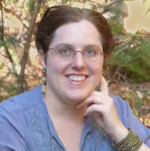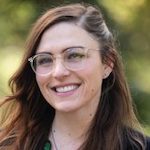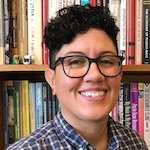CHAIR’S LETTER: Fall 2021
Dear Feminist Studies Community,
Welcome to the Fall 2021 quarter!
Whether you are taking classes on campus or online, I hope this academic year brings many new opportunities for collaboration and celebration for our Feminist Studies community. Most FMST courses will be taught remotely this fall, with the exception of small seminars, but we look forward to seeing everyone in person at some point over the course of the year.
Despite the unique challenges posed by a global pandemic, the FMST department has much exciting news to report…
The department welcomes Associate Professor Marisol LeBrón, whose research focuses on critical prison and policing and Latinx studies, particularly in Puerto Rico. We are fortunate to have Marisol join us, the result of a multi-year effort between FMST and CRES. Learn more about Marisol below.
Professor Gina Dent has been awarded a prestigious grant from the Andrew W. Mellon Foundation for Visualizing Abolition, an ongoing collaborative arts-based initiative that aims to educate the public about prison abolition. The project provides three years of support to continue the 2020-21 event series that Gina produced with the UCSC Institute of the Arts & Sciences. Congratulations to Professor Dent on this impressive recognition of her work!
In other exciting news, Professor Jenny Kelly’s manuscript, Invited to Witness: Solidarity Tourism Across Occupied Palestine, was unanimously approved by Duke University Press for publication in Fall 2022. Congratulations to Dr. Kelly on this important contribution to scholarship!
Professor Felicity Schaeffer is the new Peggy & Jack Baskin Foundation Presidential Chair for Feminist Studies, taking the reins from inaugural chair Bettina Aptheker, Distinguished Professor Emerita. Thanks to Foundation funding, the FMST department is sponsoring one of three Afghan scholars through UCSC's recent emergency fundraising effort. Read more about that below.
We also have important staffing news to share. First, Dr. Laura Wilson is our new FMST department manager. Our wonderful Taylor Ainslie is now the inaugural department manager for the new Department of Critical Race and Ethnic Studies. We thank Taylor for her years of service to Feminist Studies and welcome Laura to the department.
Second, I will be serving as interim FMST Chair through June 30, 2022. I look forward to working with the talented, committed team of faculty, staff, graduate and undergraduate students in Feminist Studies!
Zsuzsi Abrams
Interim Chair, Feminist Studies / Professor, Languages & Applied Linguistics, UCSC
Meet Laura Wilson, our new FMST Department Manager
 Please join us in welcoming Dr. Laura Wilson, who starts October 11 as the new Feminist Studies Department Manager and Graduate Program Coordinator. Laura has a broad background in the humanities, and also brings a wealth of experience in curriculum planning, campus policy, and administrative operations.
Please join us in welcoming Dr. Laura Wilson, who starts October 11 as the new Feminist Studies Department Manager and Graduate Program Coordinator. Laura has a broad background in the humanities, and also brings a wealth of experience in curriculum planning, campus policy, and administrative operations.
Laura first came to UCSC as a student, graduating in 2001 with a BA in Pre- and Early Modern Literature. She also holds an MA in Theatre Arts from UC-Santa Barbara and a PhD in the Humanities from the Self, Society and Transformation program at the California Institute of Integral Studies.
Laura returned to UCSC in 2016. For the past five years, she has worked in College Nine and John R. Lewis College, first as the assistant to the College Academic Officer, and most recently as the College Academic Manager,
“I am very excited to work in a department on the forefront of cultural and social transformation,” says Laura, “particularly one with such a rich history as the Feminist Studies department at UCSC. I look forward to supporting scholars on the leading edge of change as we work toward the world we want to see arise.”
GRADUATE STUDENT NEWS
Introducing Dr. Jessica Calvanico, our newest FMST PhD!
 Kudos to Jessica Calvanico, who graduated with her PhD in Summer 2021 and recently started a new position at Rutgers University as a postdoctoral fellow at the Institute for the Study of Global Racial Justice.
Kudos to Jessica Calvanico, who graduated with her PhD in Summer 2021 and recently started a new position at Rutgers University as a postdoctoral fellow at the Institute for the Study of Global Racial Justice.
Jessica’s research focuses on intersectional legal histories of girlhood and their connections to the prison industrial complex, carcerality, and abolition. Her dissertation, Carceral Girlhoods: The House of the Good Shepherd and “The Problem” of the Girl in New Orleans, was developed under the mentorship of FMST Professor Gina Dent. Congratulations, Jessica!
FMST grad’s network-building initiative helps bring Afghan scholars to UCSC
On August 27, in response to the Taliban takeover in Afghanistan, UCSC launched an Afghanistan Visiting Scholars Emergency Support Fund crowdfunding effort to bring Afghan thought leaders and their families to safety on the UC Santa Cruz campus.
In just one week, the ongoing campaign raised nearly $250,000 – more than $138,000 in public donations, $100,000 in matching funds from the Campus Provost and Executive Vice Chancellor’s Office, and an additional $10,000 from the UCSC Foundation Board of Trustees.
Halima Kazem-Stojanovic – an Afghan-American FMST grad student whose research focuses on women in Afghanistan – was instrumental in identifying Afghan academics, journalists, and activists for possible sponsorship. Working with a team at San José State University’s Human Rights Institute and UC Berkeley’s Human Rights Center, Halima helped establish Afghanistan Scholars at Risk to connect Afghan scholars, journalists, and activists with universities across the country – an initiative that is not only lifesaving in the present but also crucial for Afghanistan’s future.
Funds will support three at-risk Afghans with Visiting Scholar appointments at UCSC. Upon approval of visas, one Visiting Scholar will be sponsored through the Peggy and Jack Baskin Foundation Presidential Chair in Feminist Studies in partnership with the Human Rights Investigations Lab at the Research Center for the Americas. Another will be placed with UCSC’s Center for South Asian Studies, and the third will be sponsored through the Politics department.
More info on the campaign here. The public can still make a donation on UCSC’s online giving platform.
First-year FMST grads spent Summer 2021 as THI Public Fellows
Congratulations to FMST grad students Jess Fournier and Kaiya Gordon, who capped off their first year at UCSC with summer fellowships from The Humanities Institute.
Jess Fournier spent their summer working with Critical Resistance, a prison abolition organization based in Oakland, CA.
Kaiya Gordon assisted the Gay, Lesbian, Bisexual, Transgender (GLBT) Historical Society in San Francisco, which collects, preserves, exhibits and makes accessible to the public materials and knowledge to support and promote understanding of LGBTQ history, culture and arts in all their diversity.
THI’s Public Fellows develop new skills outside the university setting by contributing their scholarship and academic expertise to local organizations in the Santa Cruz, San Francisco Bay Area and Los Angeles communities. “By building bridges between the university and the community, THI Fellows learn about a broader range of possibilities for their scholarship, which gives their work a renewed immediacy as they discover how their research can serve the larger community as well as the partner organizations in need of their support and expertise,” says Irena Polić, Managing Director of The Humanities Institute.
More FMST grad student achievements
Five graduate students – Gabe Evans, Anne Fosburg, Anne Napatalung, Elana Santana, and Marina Segatti – advanced to candidacy in spring and summer 2021, all passing their Qualifying Exams with Honors!
Clare Urbanski was named a Charlotte W. Newcombe Doctoral Dissertation Fellow by the Institute for Citizens & Scholars (formerly the Woodrow Wilson National Fellowship Foundation). The 12-month fellowship will support Clare’s final year of work on her
dissertation: On Sacred and Stolen Lands: Desecration and Spiritual Violence as United States Settler Colonialism.
News from FMST PhD alums
Veronika Zablotsky – After serving as the Andrew W. Mellon Postdoctoral Fellow in the Sawyer Seminar Sanctuary Spaces: Reworlding Humanism at the UCLA Luskin Institute on Inequality and Democracy in 2020-21, Veronika has joined the Berlin University Alliance-funded project Transforming Solidarities as a postdoctoral fellow in the Department of Philosophy at Freie Universität Berlin and a research affiliate at the Humanities and Social Change Center at Humboldt-Universität zu Berlin. In Winter 2021/22, she accepted a visiting position as the Interim Chair in Gender Studies in the Department of Politics at Justus-Liebig-Universität Gießen in Germany.
UNDERGRADUATE STUDENT NEWS
Meet the 2021-22 FMST Undergrad Reps and Social Media Intern
When we put out the call for this year's FMST Undergrad Representative, we received applications from two students who volunteered to act as liaisons between the community of Feminist Studies undergrad majors and FMST faculty and staff. Undergrad Director Felicity Schaeffer and UG Advisor Anne Eickelberg thought they both had a lot to bring to the role, so we decided to have two co-representatives this year!
 Yali Bitan (they/them) is a FMST and CRES senior on track to become a high school teacher. They aim to make the world a more open and inclusive place for all people through education and community-building. They are also a musician, so hit them up to jam!
Yali Bitan (they/them) is a FMST and CRES senior on track to become a high school teacher. They aim to make the world a more open and inclusive place for all people through education and community-building. They are also a musician, so hit them up to jam!
 Nicole Moroles (she/her/hers) is a fourth-year FMST and History double major and Legal Studies minor. She’salso a lead intern at the UCSC Womxns Center. “I’m so excited to be a co-student representative for the feminist studies department!” says Nicole.
Nicole Moroles (she/her/hers) is a fourth-year FMST and History double major and Legal Studies minor. She’salso a lead intern at the UCSC Womxns Center. “I’m so excited to be a co-student representative for the feminist studies department!” says Nicole.
 Margarida Costa is our social media intern for 2021-22, creating great content on our Instagram, Facebook and twitter accounts. Margarida is a third-year FMST and Sociology double major and a minor in the GISES program. They are passionate about social justice, agroecology, and sustainability and currently work as a produce pop-up coordinator at the CASFS farm at UCSC.
Margarida Costa is our social media intern for 2021-22, creating great content on our Instagram, Facebook and twitter accounts. Margarida is a third-year FMST and Sociology double major and a minor in the GISES program. They are passionate about social justice, agroecology, and sustainability and currently work as a produce pop-up coordinator at the CASFS farm at UCSC.
Expand your college experience with an internship!
All Feminist Studies majors are strongly encouraged to do an internship. Not only is interning a great way to get real-world experience for your resume, it also fulfills one of seven upper division elective course requirements.
In recent years, FMST majors have worked at the UCSC Women's Center and the Walnut Avenue Family and Women's Center in Santa Cruz. And there are lots of other opportunities.
Here’s how the process works: Check out the internships list and contact agencies directly to see if there are positions available. If you are interested in an internship that’s not on the list, be prepared to submit a full description for approval. When you have found an internship, email FMST Undergraduate Program Director Felicity Schaeffer and cc FMST Advisor Anne Eickelberg to get approval and a code to enroll in the internship via a FMST 193 or 198.
To receive a grade and FMST credit, you must complete a minimum of 50 hours of work, certified by your internship supervisor, and complete an end-of-quarter report, which will be emailed to you during the quarter in which you’re interning.
FMST Undergrads win 2020/21 Deans' Awards
This news came too late to be included in the Spring newsletter, but we wanted to send congratulations to two FMST students who received the 2020/21 Dean's Undergraduate Research Award for outstanding scholarship and research.
We are very proud of 2021 FMST graduates Amelia Huster and Jasmine Simone, who achieved this award in recognition of their senior projects:
Amelia Claire Huster – #MeToo: An Intersectional Interrogation and Centering of Black Women – Advisor: Prof. Madhavi Murty
Jasmine Simone – The Idealized Feminine Self: Effortlessly Sexy, Confident, and Cool – Advisor: Prof. Bettina Aptheker
FACULTY NEWS
FMST and CRES welcome Professor Marisol LeBrón
 We are very pleased to welcome Marisol LeBrón as an Associate Professor in Feminist Studies and Critical Race & Ethnic Studies.
We are very pleased to welcome Marisol LeBrón as an Associate Professor in Feminist Studies and Critical Race & Ethnic Studies.
Professor LeBrón joins us from the department of Mexican American and Latina/o Studies at the University of Texas at Austin. She is a scholar of critical prison and policing studies whose interdisciplinary research, spanning the fields of critical ethnic studies, Latinx studies, and transnational American studies, is grounded in anti-imperialist critique.
Demonstrating how U.S. police and colonial power have always been two sides of the same coin, Professor LeBrón’s writings examine the imperial infrastructure behind policing and Puerto Rico’s historic function as a “laboratory for U.S. domestic and foreign policy.” LeBrón is the author of Policing Life & Death: Race, Violence and Resistance in Puerto Rico (UC Press, 2019), which traces the rise of punitive governance in Puerto Rico over the course of the 20th century to the present, and how the state uses police power to manage ongoing crises stemming from the archipelago’s incorporation into the US as a colonial territory.
Her incisive analysis of how the debt crisis, Hurricane Maria’s aftermath, and police repression have fundamentally shaped life in Puerto Rico have appeared in numerous media outlets, including The Washington Post, Truthout, and The Guardian.
Professor LeBrón is one of the creators of the Puerto Rico Syllabus, a teaching resource rooted in liberatory grassroots education, which explores the imperial geopolitics behind and people’s resistance to the pauperization of Puerto Rico. She also serves on the editorial collective of The Abusable Past, the digital companion to Radical History Review.
Professor LeBrón’s commitment to socially engaged scholarship is evident in her vibrant repertoire of classes, including “Policing Latinidad,” “Black and Latinx Intersections,” “Prisons and Punishment in American Society,” and “Queer Latino/a Studies.” She is a public intellectual whose outward-facing scholarship reflects her deep commitment to anticolonial racial justice struggles. Please join us in welcoming Professor LeBrón to UCSC!
Professor Felicity Amaya Schaeffer named Peggy & Jack Baskin Foundation Presidential Chair for Feminist Studies
Felicity Amaya Schaeffer is the new Peggy & Jack Baskin Foundation Presidential Chair for Feminist Studies, taking the reins from inaugural chair Bettina. Established in 2017 with a $500,000 gift from the Peggy and Jack Baskin Foundation and a match from the UC Regents, the $1 million endowment was created to fund research and teaching in feminist studies and provide support for graduate fellowships. The endowed chair is a three-year appointment, running through June 30, 2024.
“Over the next three years, we plan to tackle some of the most pressing issues facing us: climate change and Indigenous land-back movements; the abolition of policing, ICE, and borders; war and gendered and racialized violence; and Feminist Speculative Futures,” said Schaeffer. “Most recently, with the support of FMST graduate student Halima Kazem and faculty and staff from across campus, we are sponsoring a Visiting Scholar from Afghanistan who has fought for the rights of women and girls in education, health, the academy, and government.
“Following the path set by inaugural chair Bettina Aptheker, I intend to continue to enrich our intellectual community by bringing inspiring voices from the margins to center stage and organizing events that showcase how Feminist Studies can work on campus and within the broader community to effect change that touches all our lives.”
Founded in 2007 to provide opportunities for social change and justice, the Peggy and Jack Baskin Foundation currently focuses on improving the lives of women and girls, and equal access to education. “UCSC has developed a world-renowned department in Feminist Studies,” says the foundation’s executive director, Nicole Baran. “The Peggy and Jack Baskin Foundation made this endowment in the belief that the department’s leading example should exist in perpetuity. Feminist analytical thought must exist until all of us are equal, until all of us are equally valued in the world.”
Professor Gina Dent awarded prestigious Mellon grant for Visualizing Abolition
Gina Dent has been awarded a $1,977,000 grant from The Andrew W. Mellon Foundation to support Visualizing Abolition. Launched in fall 2020, the collaborative art and prison abolition initiative is led by Professor Dent and Dr. Rachel Nelson, Director of the UCSC Institute of the Arts and Sciences.
The three-year grant will support the development of new work by artists, musicians, humanists, and other researchers focused on examining the ways people see and understand issues of mass incarceration, detention, and policing in the US and abroad. Programs will include public online and in-person events, art exhibitions, postdoctoral fellowships, a faculty working group, and curriculum development that reaches across prison borders. A partnership with the San José Museum of Art, the largest contemporary art museum in Silicon Valley, will help to ensure the program’s reach.
“Over the last tumultuous year, we have created art exhibitions and online events bringing together artists and scholars to engage with the issue of prisons, carcerality, and abolition,” said Professor Dent. “What we have come to understand is that there is a strong cultural attachment to prisons despite all the data that prove they perpetuate inequities and fail to make people safe. Our goal with Visualizing Abolition is to emphasize the roles art, music, and culture can play in a different mode of knowing, enabling us to move toward a more just future.”
Read more about Visualizing Abolition and the Mellon grant here.
FMST Faculty Awards, Publications, and Conferences
Anjali Arondekar received a 2021-2022 UCSC Committee on Research Faculty Research Grant for her project: Les Indes Fabuleuses: Sexuality and Colonial French India.
Jenny Kelly received a 2021-2022 UCSC Committee on Research Faculty Research Grant for Detours: A Decolonial Guide to Palestine – a volume in the Detours series of alternative guidebooks at Duke University Press, co-edited with Somdeep Sen (Roskilde University) and Lila Sharif (UIUC).
Felicity Schaeffer was featured on The Atlantic magazine’s May 6 The Experiment podcast, which looked at TLC's "90 Day Fiancé" and how biases of race intersecting with class and sexuality influence the federal government and US immigration. Felicity also was a co-editor of Precarity and Belonging: Labor, Migration, and Noncitizenship – authored by Catherine Ramirez (LALS) and co-edited with several UCSC faculty (Rutgers University Press, June 2021).
Gina Athena Ulysse was featured on WNYC's "On the Media" podcast series. The August 4 interview, “Why Haiti needs new narratives,” discussed Haiti’s latest political crisis, the July 7th assassination of President Jovenel Moïse, and how the international media too often spreads dehumanizing narratives of perpetual chaos in Haiti — setting the stage for intervention — and then looks away.
ALUMNI SPOTLIGHT - Five Questions with a Feminist
Heather Boerner, Independent Journalist | Class of 1996
The Five Questions with a Feminist interview series spotlights former FMST majors who have gone on to do great things. Visit our YouTube channel to view Professor Felicity Schaeffer’s recent interview with FMST alum Heather Boerner. Below is an edited version of their conversation.
 Heather Boerner is a Women’s Studies alum (the precursor to Feminist Studies at UCSC) and graduated in 1996 with a minor in journalism. Heather is an independent journalist and author who specializes in telling stories at the intersection of science, society and policy. Her work has appeared in media outlets including NPR, Al Jazeera America, The Atlantic, Washington Post, PBS News Hour and many, many others. She also is the author of Positively Negative: Love, Pregnancy, and Science’s Surprising Victory over HIV, published in 2014. Heather lives in Pittsburg, PA with her partner Paula and their wildlife friendly garden.
Heather Boerner is a Women’s Studies alum (the precursor to Feminist Studies at UCSC) and graduated in 1996 with a minor in journalism. Heather is an independent journalist and author who specializes in telling stories at the intersection of science, society and policy. Her work has appeared in media outlets including NPR, Al Jazeera America, The Atlantic, Washington Post, PBS News Hour and many, many others. She also is the author of Positively Negative: Love, Pregnancy, and Science’s Surprising Victory over HIV, published in 2014. Heather lives in Pittsburg, PA with her partner Paula and their wildlife friendly garden.
Tell us about your career as a journalist and what you love about it.
I’ve been a newspaper reporter for many years and self employed as a journalist since 2004. I’ve written about all kinds of things – transportation, housing, education. Over the last ten years I’ve written about HIV, primarily as a way to talk about equity and inequity. At this point, the disparities are the story. We have medications that work, we have prevention methods, we know how to do it. That’s not the issue, so I primarily write about that piece of it. I write for clinicians and regular people and try to focus on telling stories and sharing the wisdom of communities that are often not listened to.
How did you decide to major in Feminist Studies at UCSC?
I arrived at UCSC in 1992 set to be a Creative Writing major. I went to an event that Bettina Aptheker held before the term started about what Feminist Studies was all about. There was a discussion about a book related to black women’s experiences with the law and sexual harassment. The Clarence Thomas confirmation hearings had just happened, so it was very pertinent And I fell in love. Bettina said, if you can’t get in to FMST 101, let me know and I’ll get you in. So I did. She’s a wonderful spirit. I hope the library still has recordings of her class.
Felicity: Yes, Bettina is recently retired, but the library has recordings and also at the department.
How did FMST help you in your career goals?
More than anything, what the curriculum taught me was the value of our own lived experiences over the gatekeepers and so-called experts who are often white-hetero-normative-cis. And they’re not objective. One of the main things I learned is that we are our own experts and we can save ourselves. I’m getting goosebumps because it means so much to me. I had my white savior complex when I first entered the field [of journalism]. Over time I’ve lived long enough and done enough work to realize that I’m not giving voice to anyone. I’ve just taken the cotton out of my own ears and listen to people who have been talking and screaming forever about these things, and they have their own solutions.
What were your favorite FMST class or classes?
All these years later I still remember specific courses. I still worship at the altar of Bettina Aptheker; she was the most empathetic face of Women’s Studies for me and really changed my life. There were two other classes I remember. One was “multi-cultural feminism” and it was an intro for white suburban feminists like me that told us our feminism wasn’t the only feminism. It was taught by Akasha Hull; we read This Bridge Called My Back, and many other things, and it was just transformative for me. I also took a class with Elizabeth Haas in the History department about women’s social movements that took feminist theories and grounded them in a place and time in politics. That has been crucial to my career. In my reporting, I put the things I’m writing about into the social-political-historical context that we’re in.
When you reflect back, are there other important things you learned as a Feminist Studies major?
I was a feminist in high school. I read The Feminine Mystique [by Betty Friedan] and Backlash [The Undeclared War Against American Women by Susan Faludi]. Everyone thought I was a dyke – which I was, but I didn’t know it. I really learned how important it is to love us. I don’t hate men, I just love women. I love women’s cultures, and our creativity, and our power. It was misinterpreted in the wider world. We see that today in Black Lives Matter and other movements happening. It really taught me the value of us loving us, and how that helps us survive in the world. How it helps make art, create solutions, and that there are no margins if you’re part of that community. And there’s such beauty there.
Practically, what I learned as a journalist is that it’s really important to ask who gets to tell the story, and also who is the audience. If I think my audience for a story about HIV is a white upper- or middle-class white person with private health insurance who hasn’t experienced the oppression that a lot of other people have, I write a very different story than if I’m writing for a reader who understands that systemic racism isn’t a theory, it’s a fact. Who I assume understands what it’s like to go to the doctor’s office and be discriminated against. It's so freeing to write from the latter point of view. [If you’re writing] for the former, it’s the same rote story over again and it never goes anywhere. An in-group conversation among white people isn’t going to solve anything.
And personally, the Women’s Studies department was the first place I ever saw a “high femme.” At the time in the ‘90s, we all wore the same thing, very androgynous. I love non-binary, but that wasn’t me. I really got to see people live their lives. I remember people saying, she can’t be a lesbian, look at her make up. It took me years to be a queer high femme and know that I can be feminine and flamboyant and articulate and brilliant, and also have a pink office, which I do, and celebrate traditional feminine handicrafts. All the much-maligned things that don’t have to be maligned anymore. That’s what I learned by watching people.
Felicity: That’s the great thing about seeing so many different people. There’s no one way to be, and there are so many ways to be radical.
Heather: I see that in my career. Most people are really articulate about their own stories. People I interview often say, “I don’t know if I’m making sense.” Of course they’re making sense. I feel so blessed to work in a career where people are generous to share their experiences with me. I try to respect that.
Is there anything you can share with our students, especially in relation to the difficult moment we’re in? Any advice on how to persevere for those who may be struggling?
It’s a particularly traumatic time for a lot of us; we’re still recovering from the last four years and ongoing everything. As a human being to another human being, I’d say you don’t have to be strong all the time. Everybody breaks, and that’s ok. We need to give ourselves downtime, that’s critical. I also think it’s important to know that your voice matters, your wisdom matters. What I’ve learned is that we can make – or try to make – the world a better place just by being yourself. Find the communities that support that. For me, Women’s Studies and the On the Hill press were the communities that kept me safe. Within that safety you can find the strength to do the next thing. That’s what gets me through.
Follow Heather on twitter @HeatherBoerner. Below are links to some of her articles:
How Black Women Have Fought the HIV Epidemic for Decades
To Halt HIV, Advocates Push for PrEP Outreach to Black Women
Lessons From the HIV Epidemic for the COVID-19 Pandemic
All Clinicians Have Unforgettable Patients: This One Has HIV
HIV PrEP Referrals Lag for Black MSM, Trans Adults
FMST EVENTS AND OTHER EVENTS OF INTEREST
Feminism in Mexico: Intergenerational and Transnational – October 12, 12-2 pm
A panel discussion led by Distinguished Professor Eli Bartra, Professor of Feminist Studies at the Universidad Autonoma Metropolitana-Xochimilco, Mexico City. Professor Bartra is the author of Feminism and Folk Art(2018) and Women in Mexican Folk Art (2011), and is a leading activist on feminist issues in Mexico City. Also on the panel is Anna Lee Mraz Bartra, an independent scholar from Mexico who holds a Ph.D. in Political and Social Sciences from the Universidad Autonoma de Mexico, with a focus on women in Mexico and cross cultural social activism. Co-sponsored by Feminist Studies. This is an in-person event in HUM 1 room 202; please register here.
Dissent Lecture Series: 2021-22 – begins October 15, 10 am PT
The UCSC Center for South Asian Studies and THI present this year-long lecture series, curated by FMST professor Anjali Arondekar. All lectures are virtual and start at 10am PT. Visit csas.ucsc.edu/events to learn more about each event and to register.
- October 15 – In Memoriam: Stories of Dissent in Sri Lanka – Sharika Thiranagama, Stanford University
- November 19 – Risk and Respectability: Sexuality and the Nation in the Time of Aids – Gowri Vijayakumar, Brandeis University
Works-in-Progress with Rebecca Herzig on Science, Justice, and University Abolition – October 27, 4-5:30 pm PT
Join scholars from UCSC’s Science & Justice Research Center for an open discussion with remote visiting scholar Rebecca Herzig, Professor of Gender and Sexuality Studies at Bates College. This talk, part of a larger work-in-progress on US higher education, draws together left abolitionist approaches to the university and decolonial, anti-capitalist, and queer feminist critiques of science. As part of this event, we will read and reference Nick Mitchell's co-authored call on Abolitionist University Studies. Register here.
Book launch: Precarity and Belonging: Labor, Migration, and Noncitizenship – November 9, 12-1:30 pm PT
Join us for a webinar book launch for Precarity and Belonging: Labor, Migration, and Noncitizenship (Rutgers University Press, June 2021), with UCSC co-editors Catherine S. Ramírez, Sylvanna M. Falcón, Juan Poblete, Steven C. McKay, and Felicity Amaya Schaeffer. For more info and to register, go here.
UPCOMING DEADLINES
HASTAC Scholars Fellowship – Deadline October 15
The HASTAC Scholars program is a student-driven community of grad and undergrad students from dozens of disciplines, sponsored by over 200 college and universities. Each year, around 100 Scholars are accepted into a new two-year cohort. Applicants must identify a faculty or staff member who will mentor and sponsor the fellowship. For more info about the program and to apply, go here.
Koret Undergraduate Research Scholarship – Deadline October 22
With generous support from the Koret Foundation, this year we offer 50 scholarships of $2000 to undergraduate student researchers from any discipline. Koret Scholars will pursue their research under a faculty or graduate student mentorship during winter and/or spring 2022. More info here.
2022-23 UC President's Postdoctoral Fellowship Program – Deadline November 1
Established in 1984 to encourage outstanding women and minority Ph.D. recipients to pursue academic careers at the University of California, these fellowships are awarded for research conducted at any one of UC’s ten campuses. The award includes a salary starting at approximately $54,540 plus benefits and expense funds. Each award is for a minimum of 12-months and may be renewable for an additional term upon demonstration of academic/research productivity. Applicants must receive a Ph.D. or terminal degree from an accredited university before the start of their fellowship. Apply online.
Pathways to Research (P2R) – Deadline November 5
This UCSC research mentorship program matches undergrads in the social sciences with a graduate student mentor who will guide them through the research design and graduate school application processes. Students are awarded a research stipend and present their work at our Spring Symposium in May. Learn more and apply here.

